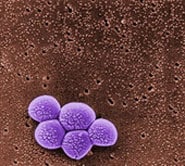Veterinary Safety & Health: Biological Safety
- Overview of biological safety
- Allergens
- Anthrax
- Avian influenza
- B Virus
- Biosecurity
- Brucellosis
- Laboratory Safety
- Leptospirosis
- Medical Water
- Methicillin-resistant Staphylococcus aureus (MRSA)
- One Health
- Parasites
- Personal Protective Equipment (PPE)
- Psittacosis and Chlamydiosis
- Rabies
- Standard Precautions
- Swine Influenza
- Tuberculosis
- Vector-Borne Diseases
- Waste Disposal
- Zoonoses

Biological Safety
Veterinary medicine and animal care workers are at risk of exposure to zoonoses, infectious diseases that spread from animals to humans. Possible routes of transmission include aerosol, droplet spray, ingestion (oral), direct contact, indirect contact (e.g., fomite), or vector-borne. Sources of exposure include animals, body fluids, contaminated tools, surfaces, or other objects in the environment.
Approximately 60% of the more than 1400 human pathogens are zoonotic. About 75% of emerging pathogens are zoonotic. Zoonoses reported in veterinary personnel include salmonellosis, cryptosporidiosis, plague, sporotrichosis, methicillin-resistant Staphylococcus aureus (MRSA), psittacosis, dermatophytosis, leptospirosis, and Q fever. Other zoonoses of veterinary concern include rabies and toxoplasmosis.
Overview of biological safety
NASPHV Veterinary Standard Precautions Compendium
NASPHV Model Infection Control Plan for Veterinary Practices
CDC Hand Hygiene in Healthcare Settings
CDC Biosafety in Microbiological and Biomedical Laboratories
CDC Healthy Pets Healthy People
NIOSH Eye Protection for Infection Control
AVMA Veterinary Facility Occupational Risks for Pregnant Workers
Center for Food Security and Public Health, Iowa State University: Infection Control
Rabinowitz P, Conti L [2010]. Human-animal medicine: clinical approaches to zoonoses, toxicants and other shared health risks. Maryland Heights, MO: Saunders.
Allergens
NIOSH Alert: Preventing Asthma in Animal Handlers
Anthrax
Avian influenza
NIOSH Alert: Protecting Poultry Workers from Avian Influenza (Bird Flu)
Center for Food Security and Public Health, Iowa State University: Avian Influenza
B Virus
NIOSH Hazard ID 5 – Cerpopithecine herpesvirus 1 (B Virus) Infection Resulting from Ocular Exposure
Biosecurity
Center for Food Security and Public Health, Iowa State University: Infection Control
National Biosecurity Resource Center for Animal Health Emergencies
USDA/U Nebraska/Kansas State/Iowa State Farm and Ranch Biosecurity
National Center for Foreign Animal and Zoonotic Disease Defense Resource Library
Australia National Zoo Biosecurity Manual March 2011
Brucellosis
CDC Brucellosis Information for Veterinarians
Center for Food Security and Public Health, Iowa State University: Brucellosis
Laboratory Safety
CDC Guidelines for Safe Work Practices in Human and Animal Medical Diagnostic Laboratories
CDC/NIH Biosafety in Microbiological and Biomedical Laboratories, 5th edition
OSHA Laboratory Safety – Working with Small Animals
Leptospirosis
Center for Food Security and Public Health, Iowa State University: Leptospirosis
Medical Water
Methicillin-resistant Staphylococcus aureus (MRSA)
One Health
Florida Dept of Health One Health Newsletter
AVMA Aardvarks2Zebras: Connections between humans, animals and the environment
Yale University School of Medicine Canary Database
Parasites
Companion Animal Parasite Council
Personal Protective Equipment (PPE)
NIOSH Personal Protective Equipment for Health Care Workers Who Work with Hazardous Drugs
NIOSH Respirator Selection Logic 2004
Psittacosis and Chlamydiosis
NASPHV Psittacosis and Chlamydiosis
Center for Food Security and Public Health, Iowa State University: Psittacosis
Rabies
CDC Rabies Information for Veterinarians
NASPHV Animal Rabies Compendium
Center for Food Security and Public Health, Iowa State University: Rabies
Standard Precautions
Swine Influenza
CDC Information for Pork Producers and People Who Work With or Raise Pigs
CDC Guidance Documents Related to Preventing the Spread of Influenza A Viruses
Tuberculosis
USDA APHIS Guidelines for the Control of Tuberculosis in Elephants 2008
NIOSH Tuberculosis Information
Center for Food Security and Public Health, Iowa State University: Bovine Tuberculosis
CDC EID Journal Article: Elephant-to-Human Transmission of Tuberculosis, 2009
Vector-Borne Diseases
Waste Disposal
AVMA Waste Disposal by Veterinary Practices: What Goes Where?
National Center for Manufacturing Sciences Veterinary Compliance Assistance
Zoonoses
AVMA Collections: Zoonosis Updates
Center for Food Security and Public Health, Iowa State University: Infection Control
Center for Food Security and Public Health, Iowa State University: Zoonoses Information
University of Minnesota Center for Animal Health and Food Safety Fact Sheets
U.S. Marine Mammal Commission Working with Marine Mammals and Your Health
National Center for Foreign Animal and Zoonotic Disease Defense Resource Library
Ontario Veterinary College Centre for Public Health and Zoonoses: Worms and Germs Blog Resources
